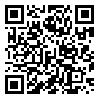Volume 2, Issue 145 (5-2017)
J Except Educ 1396, __(145): 59-67 |
Back to browse issues page
Download citation:
BibTeX | RIS | EndNote | Medlars | ProCite | Reference Manager | RefWorks
Send citation to:



BibTeX | RIS | EndNote | Medlars | ProCite | Reference Manager | RefWorks
Send citation to:
Fazaeli S M, Arabi B. Teaching Children with Autism to Detect and Respond to Sarcasm. J Except Educ 2017; 2 (145) :59-67
URL: http://exceptionaleducation.ir/article-1-583-en.html
URL: http://exceptionaleducation.ir/article-1-583-en.html
1- Ferdowsi University of Mashhad , mr.fazaeli@hotmail.com
2- Varastegan Institute for Medical Science
2- Varastegan Institute for Medical Science
Abstract: (4878 Views)
Background: Previous research has demonstrated that children with autism often have difficulty using and understanding non-literal language (e.g., irony, sarcasm, deception, humor, and metaphors). Irony and sarcasm may be especially difficult for children with autism because the meaning of an utterance is the opposite of what is stated. The current study evaluated the effectiveness of a training package, including rules and in vivo multiple exemplar training, to teach three children with autism to detect and respond appropriately to sarcastic statements. Conclusion: The training package was effective and generalization was obtained across novel exemplars, settings, and people.
Type of Study: translate |
Subject:
General
Received: 2015/Apr/Mon | Revised: 2017/Aug/Sun | Accepted: 2017/Apr/Mon | Published: 2017/Jul/Mon | ePublished: 2017/Jul/Mon
Received: 2015/Apr/Mon | Revised: 2017/Aug/Sun | Accepted: 2017/Apr/Mon | Published: 2017/Jul/Mon | ePublished: 2017/Jul/Mon
Send email to the article author
| Rights and permissions | |
 |
This work is licensed under a Creative Commons Attribution-NonCommercial 4.0 International License. |




